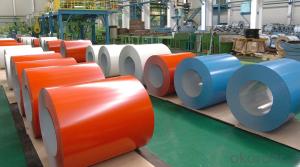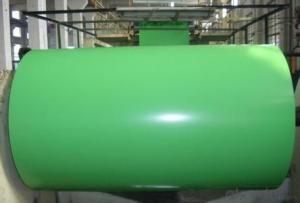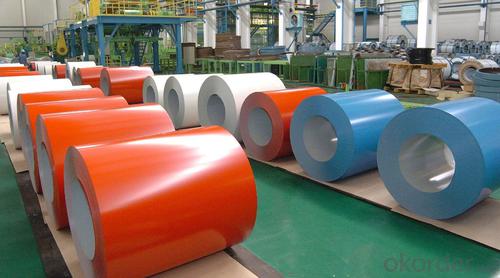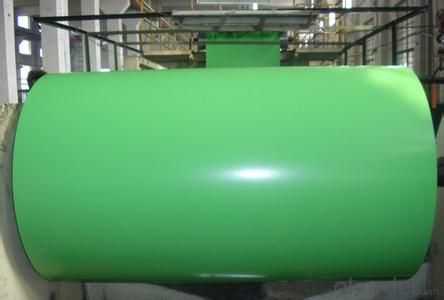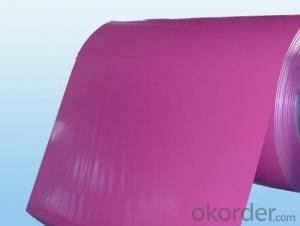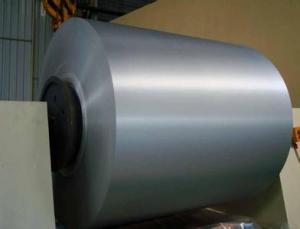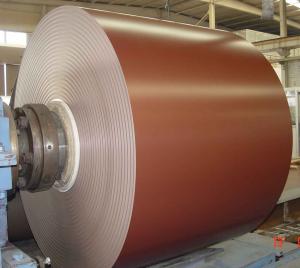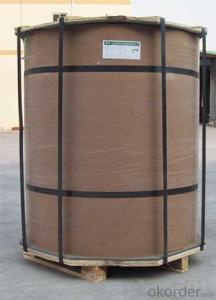032 Aluminum Coil - Prepainted Aluminum Coils 3xxx
- Loading Port:
- China Main Port
- Payment Terms:
- TT OR LC
- Min Order Qty:
- -
- Supply Capability:
- -
OKorder Service Pledge
OKorder Financial Service
You Might Also Like
Specifications
1.Thickness:0.2-4mm
2.Width:800-1900mm
3.excellent quality and reasonable price
4.fast delivery time
color coated aluminum coil
1.Thickness:0.2-4mm
2.Width:800-1900mm
3.excellent quality and reasonable price
4.fast delivery time
Color coated aluminum sheet/coil
| |
Alloy grade | 1050,1060,1100,3003,3004,3005,3105,5005,5052 ,5754 etc |
Hardness | 0,H12,H14,H16,H18,H22,H24,H26,H32,H34,H111, |
Thickness | 0.2-4mm |
width | 800-1900mm |
Popular size | 1000*2000,1200*2400,1219*2438,1220*2440 |
Color | white, gray ,gold ,blue, red, etc |
Coating | Polyester, Fluorocarbon, polyurethane and epoxy coating |
Application/use | Outdoor decoration, business chain, exhibition of advertisement decoration and display ,ACP, wall cladding, facades, roofs and canopies, ceilings, signboards, blind window, display platforms, electrical panels etc |
MOQ | 3-5 tons, negotiable |
Payment terms | T/T or L/C |
Delivery | About 15 days after receipt of deposit |
Package | Export standard package |
Kindly remind | Our machine can cut any size according to your requirement |
- Q: Are aluminum coils suitable for decorative applications?
- Yes, aluminum coils are suitable for decorative applications. Aluminum is a versatile and lightweight material that offers excellent corrosion resistance, making it an ideal choice for decorative purposes. It can be easily shaped, formed, and fabricated into various designs, patterns, and finishes, allowing for endless possibilities in decorative applications. Additionally, aluminum coils can be coated with different colors and finishes, such as anodized or painted, to enhance their aesthetic appeal and durability. Whether it's for interior or exterior decoration, aluminum coils provide a cost-effective and visually appealing solution.
- Q: How are aluminum coils coated or finished?
- Aluminum coils are commonly coated or finished through processes such as painting, anodizing, or laminating. Painting involves applying a protective layer of paint or coating onto the aluminum surface to enhance its appearance and protect it from corrosion. Anodizing, on the other hand, involves creating a controlled oxide layer on the surface of the aluminum, which provides durability, improved color options, and resistance to corrosion. Laminating is another method where a protective film or layer is added to the aluminum coil, providing additional protection and improving its aesthetic appeal.
- Q: What are the advantages of using aluminum coils?
- There are several advantages to using aluminum coils. Firstly, aluminum is a lightweight material, which makes the coils easier to handle and transport. Secondly, aluminum is highly resistant to corrosion, making it a durable choice for various applications, especially in humid or corrosive environments. Additionally, aluminum has excellent thermal conductivity, allowing for efficient heat transfer in applications such as HVAC systems or refrigeration. Lastly, aluminum coils are recyclable, making them a more sustainable option compared to other materials.
- Q: Are there any limitations or restrictions on the use of aluminum coils?
- Aluminum coils come with limitations and restrictions that need to be taken into account. Some of the key limitations are as follows: 1. Corrosion: Aluminum is prone to corrosion, especially when exposed to certain chemicals or environments. This means it may not be suitable for applications where it will encounter corrosive substances or highly corrosive environments. 2. Strength: Although aluminum is lightweight, it lacks the strength of metals like steel. This limits its use in applications requiring high strength or load-bearing capabilities. 3. Temperature sensitivity: Aluminum has a lower melting point compared to other metals, which can be a drawback in applications involving high temperatures. It may not be suitable for certain industrial or high-temperature environments. 4. Electrical conductivity: While aluminum has good electrical conductivity, it falls short of copper's conductivity. This can limit its use in applications requiring high electrical conductivity, such as electrical wiring or power transmission. 5. Cost: Aluminum can be more expensive than other metals, making it less favorable in cost-sensitive applications. In such cases, alternative materials may be preferred. 6. Formability: Compared to some other metals, shaping or forming aluminum coils can be challenging. This restricts their use in applications that demand complex shapes or tight tolerances. When selecting aluminum coils for a specific purpose, it is crucial to consider these limitations and restrictions. A careful evaluation of the particular requirements and constraints will help determine whether aluminum coils are suitable or if alternative materials should be considered.
- Q: What are the necessary safety measures to take when handling aluminum oxide coated aluminum coils?
- <p>When working with aluminum oxide coating on aluminum coils, it's crucial to follow safety precautions. Always wear appropriate personal protective equipment (PPE), including gloves, safety glasses, and a dust mask to prevent inhalation of dust particles. Ensure proper ventilation to avoid dust accumulation. Handle the material carefully to prevent any skin contact with the coating. Keep the area clean and free from any flammable materials to avoid fire hazards. Be aware of the specific health risks associated with aluminum oxide exposure, and follow the manufacturer's guidelines for safe handling. Regularly inspect equipment for any signs of wear or damage that could lead to accidents.</p>
- Q: Are there any health concerns associated with aluminum coils?
- There are some health concerns associated with aluminum coils, but they are generally considered to be minimal. Aluminum coils are commonly used in HVAC systems and refrigerators, and there have been some concerns regarding potential health risks related to the release of aluminum particles into the air or food. However, studies have shown that the amount of aluminum released from these coils is typically very low and does not pose significant health risks. While aluminum is a known neurotoxin, the levels of aluminum exposure from aluminum coils are generally well below the threshold that could cause harm. The World Health Organization (WHO) has set a provisional tolerable weekly intake for aluminum, and the amount typically released from aluminum coils is significantly below this level. It is important to note that individuals with certain health conditions, such as kidney disease or aluminum sensitivity, may be more susceptible to the potential health effects of aluminum exposure. In such cases, it is advisable to consult with a healthcare professional or an HVAC specialist to determine the best course of action. Overall, while there are some health concerns associated with aluminum coils, they are generally considered to be minimal and unlikely to pose significant risks to the general population. Regular maintenance and proper installation of HVAC systems can help minimize any potential risks and ensure the safe and efficient operation of aluminum coils.
- Q: How are aluminum coils inspected for quality?
- Aluminum coils are inspected for quality through a series of rigorous tests and inspections. These inspections are crucial to ensure that the coils meet the required industry standards and specifications. One common method used to inspect aluminum coils is visual inspection. Trained inspectors visually examine the coils for any visible defects such as surface scratches, dents, or any other physical imperfections that may affect the quality of the coil. This inspection is typically done using specialized lighting and magnification equipment to ensure thorough examination. Another important inspection method is dimensional inspection. In this process, the dimensions of the aluminum coils are measured and compared against the specified tolerances. This helps ensure that the coils meet the required size and shape requirements. Coating inspection is also an essential part of the quality inspection process. The coating on aluminum coils is inspected for uniformity, adhesion, and thickness. Specialized instruments are used to measure the coating thickness and ensure that it meets the specified requirements. Additionally, mechanical properties such as tensile strength, yield strength, and elongation are tested to assess the strength and durability of the aluminum coils. These tests involve subjecting samples from the coils to controlled stress and measuring their response. Lastly, various non-destructive testing techniques are employed to detect any hidden defects or flaws that may not be visible to the naked eye. These techniques include ultrasonic testing, eddy current testing, and dye penetrant testing. These methods help identify any internal defects such as cracks or voids that could compromise the quality of the aluminum coils. Overall, a combination of visual inspections, dimensional measurements, coating inspections, mechanical property testing, and non-destructive testing techniques are employed to thoroughly inspect aluminum coils and ensure their quality before they are deemed suitable for use in various industries such as construction, automotive, and aerospace.
- Q: Are aluminum coils available in custom sizes?
- Yes, aluminum coils are available in custom sizes. Aluminum coils are versatile and can be manufactured to meet specific size requirements. This flexibility allows for a wide range of applications across various industries. Whether it's for HVAC systems, transportation, construction, or other purposes, aluminum coils can be custom-made to fit the specific needs of a project. Custom-sized aluminum coils ensure a perfect fit and optimal performance, offering greater efficiency and cost-effectiveness.
- Q: Can aluminum coils be used in telecommunications infrastructure?
- Telecommunications infrastructure can employ aluminum coils as they possess several advantages. Firstly, aluminum, being a lightweight and durable material, finds extensive use in various industries, including telecommunications. Its cost-effectiveness, when compared to metals like copper, makes it a preferred choice for many companies in this sector. Moreover, the lighter weight of aluminum coils facilitates easier handling and installation, resulting in reduced labor and transportation costs. Additionally, aluminum's excellent electrical conductivity makes it suitable for transmitting data signals in telecommunications networks. By effectively carrying electrical current, aluminum coils ensure efficient data transmission without compromising quality. Consequently, reliable and high-speed communication over long distances becomes possible. Another advantage of incorporating aluminum coils in telecommunications infrastructure lies in their resistance to corrosion. When exposed to air, aluminum naturally forms a protective oxide layer, preventing rusting and corrosion. This resistance enhances the longevity and durability of the infrastructure, thereby reducing maintenance and replacement expenses over time. Nevertheless, it is crucial to acknowledge that aluminum possesses lower tensile strength than copper. Therefore, the infrastructure's structural integrity must be adequately considered and engineered when employing aluminum coils. Additionally, specific connectors and compatible hardware may be necessary. In conclusion, the use of aluminum coils in telecommunications infrastructure is highly effective due to their cost-effectiveness, lightweight nature, electrical conductivity, and corrosion resistance. Proper planning and design are imperative to ensure the successful implementation of aluminum coils in telecommunications networks.
- Q: How do aluminum coils compare to iron coils in terms of weight?
- Aluminum coils are significantly lighter than iron coils in terms of weight. This is because aluminum has a lower density than iron, which means it weighs less for the same volume. Aluminum is about one-third the weight of iron, making it a much lighter material for coil applications. This weight advantage is particularly beneficial in industries where weight reduction is crucial, such as automotive and aerospace, as it helps improve fuel efficiency and overall performance.
Send your message to us
032 Aluminum Coil - Prepainted Aluminum Coils 3xxx
- Loading Port:
- China Main Port
- Payment Terms:
- TT OR LC
- Min Order Qty:
- -
- Supply Capability:
- -
OKorder Service Pledge
OKorder Financial Service
Similar products
Hot products
Hot Searches
Related keywords
